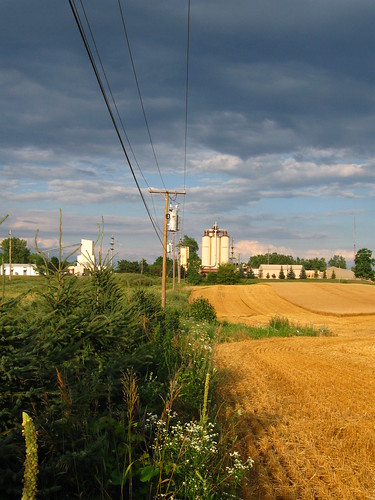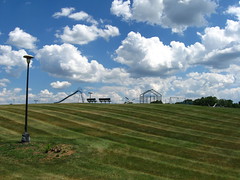I decided to cycle out to the
Shadow Art Fair in Ypsi today. I'd never cycled out to Ypsi before, but knew roughly how to do it: go along the river, following the
Borders to Borders (aka B2B) trail to Ypsi. I also knew roughly where the Shadow Art Fair was being held --
the Corner Brewery -- and so I felt pretty confident.

On the trip out, I had to make a detour to
Great Lakes Cycling and Fitness to ask a small question about my bike before heading down Pauline and toward the Geddes neighborhood. (The Geddes neighborhood is known for its lack of a grid pattern, and its turn-around roads which make cutting through a difficulty.) Due to my lack of knowledge of the Geddes neighborhood, I soon found myself back out on Washtenaw Ave, but instead of trying to find another way to cut through (because I
know there are ways to do it), I just decided to stop off at Walgreen's and pick up some M&M's (bike fuel, donchaknow?). I bumped into some colleagues walking back home with their young kids as I continued by going up Huron Parkway, and they were either impressed or incredulous that I was cycling out to Ypsi. "Keep hydrated!" was the advice I was given as I continued on my ride. Luckily, I had about 1.5 liters of water -- 0.5 of which was cold and in a thermos.

I reached Gallop Park and quickly found the B2B trail, and headed out, at roughly 15mph, but soon found myself at what looked to be a dead-end (or at least being shunted north into the Fleming Creek watershed instead of continuing east-ish along the Huron River). I recognized the
Parker Mill when I rode up to it, and knew that I was going in the wrong direction. Apparently, I had messed up somewhere... I backtracked, checking all the possible outlets, but they all seemed wrong. As I continued backtracking, I found
another B2B sign (these things are not always that large or obvious) pointing up the hill, along the access road, and up to the bridge. Oh, well, I guess I have to continue on the road.
Surprisingly, the bike lane was quite wide, and very smooth, and I was soon speeding again along toward the Shadow Art Fair. Once I reached
St. Joe's Hospital, I saw that the B2B trail circled to the north, but on the sidewalk this time. I continued along that one -- a very nice piece of sidewalk, with bike and foot paths labeled at curves -- until I reached Eastern Michigan University campus. At this point, I lost the B2B trail. Whether this was due to the construction going on in EMU, or just because I was blind, but I ended up just riding along the road leading to the stadium before I reached a dead-end, cut over a hill, cycled someway through campus, and then finally ended up near the water tower.

Ah! The water tower. A landmark against which I had some sort of bearing. I stopped to take a photo of the
Spanish American War monument placed in front of the Domino's Pizza (the original store, I believe...) and another of
the most phallic building in America before continuing into the downtown area. ... which I quickly learned was a cycle-in-the-street-only section of the city, and I would have liked to comply, except for that section of street that I was on was blockaded for some reason, so I continued on foot, walking my bike toward Michigan Avenue, and the downtown of Ypsilanti.
All my memories of going to the Corner Brewery were from Frog Island park, and so my plan had been to head there, and then cut through the park to go to the brewery. However, once I arrived at the park, I saw that there was a large music festival going on. Two fluorescent-yellow T-shirted event staff members told me what I had rolled into: Elvis Fest.
"Elvis Fest?" I asked, blank-facedly.. I hadn't heard that there was a celebration for the King of Rock. Apparently, though, I was ill-informed, since a large part of Frog Island park was covered with concert-goers. "I'm trying to get to the Shadow Art Fair. Do you know where the Corner Brewery is?" I asked the man as the woman walked over to a newly arrived car to show where to park.
"Shadow Art Fair?" The guy was as lost about it (and the Shadow Art Fair) as I apparently was about Elvis fest. We stared at each other, amazed at the other's lack of what should have been such plain-faced knowledge. "Maybe this guy'll know," he said, pointing to a random man walking in to enjoy Elvis Fest. "Hey, buddy, do you know where the Shadow Art Fair or the Corner Brewery is?"
Long pause as the man spent time to take in the words, realize that we were asking directions (and not telling him that he had come to the wrong event) and then some more time as he thought about the best way for me to cycle there. "Umm...." he started. "If you take... no. If you, no. Wait."
Eventually, he got it, and I was back on my way, and once I made my way to the other entrance to Frog Island Park, things became more familiar. There was the Michigan Ladder Company factory, and the Corner Brewery was only a little distance away!
The building was not as packed as in previous years, but it was still fun. (I learned later that the events this year were spread across a few venues.) As I walked around the vendors inside the brewery, I sipped on a
Sacred Cow IPA (yummy), and after chatting with a potter and a T-shirt artist, I went outside to listen to the band for a little bit. However, they were just finishing up their set, and intervening period was seemed that it would be filled with me baking slowly in the sun, so I decided to head back into the bar area. Sitting at the long bar, I ordered the
high-alcohol Arborealis IPA (also yummy) and took a self-portrait.

While the Shadow Art Fair was originally the destination of my excursion, now that I was there, it didn't hold as much interest as it did when I was planning my trip. Indeed, the trip itself was a lot more exciting and interesting than the shopping inside. So, after another circle around, I headed out and back to Ann Arbor.
Since I basically knew the way back (I again got turned around in the EMU campus), and I didn't stop to take photos, the trip back took about half the time, and I soon found myself near Depot Street, Ann Arbor, so I decided to pay a visit to to Ft. Hiscock and the residents there... some of whom were just then getting ready to head out to the Shadow Art Fair! Still, I stayed for a little cool-down and catch-up before heading the final 4 miles back to the forest.
In total, the trip today was 34.33 miles. Compared to
my last long cycling excursion (with my old Giant hybrid bike), this roundtrip was a
lot more enjoyable (less windy, less hilly, and a better bike), and faster, too. Now that I know that the trip to Ypsi isn't so bad (and in some ways easier than cycling to Dexter), I might go more often. ("Might" being the key word there...)


















